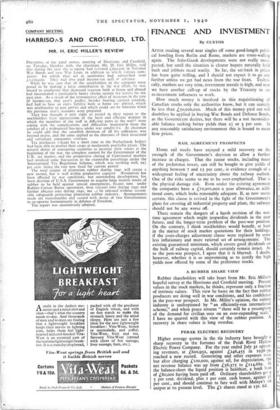FINANCE AND INVESTMENT
By CUSTOS
AFTER stealing several neat singles off some good-length politi- cal bowling from Berlin and Rome, markets are stone-walling again. The Italo-Greek developments were not really unex- pected, but until the situation is clearer buyers naturally hold back and jobbers tread warily. So far, the set-back in prices has been quite trifling, and I should not expect it to go any further unless we get had news from the war front. Techni- cally, markets are very trim, investment morale is high, and now we have another call-up of stocks by the Treasury to set re-investment influences to work.
How much money is involved in this requisitioning of Canadian stocks only the authorities know, but it can scarcely be less than 5o,00o,000. Much of this money paid out will doubtless be applied in buying War Bonds and Defence Bonds, as the Government desires, but there will be a not inconsider- able balance seeking better yields than 21 or 3 per cent. In any reasonably satisfactory environment this is bound to mean firm prices.
RAIL AGREEMENT PROSPECTS
Home rail stocks have enjoyed a mild recovery on the strength of the Government's decision to allow a further increase in charges. That the junior stocks, including many of the preference issues, can still be bought to give yields of anything between 7 and 15 per cent., is evidence enough of a widespread feeling of uncertainty about the railway outlook. One of the risks seems to me to be over-emphasised. That is the physical damage risk. Even under the existing agreement the companies have a £Io,000,000 a year allowance, as addi- tional costs, which looks reasonably adequate. If, as now seems certain, this clause is revised in the light of the Government's plans for covering all industrial property and plant, the railways should not be any worse off.
There remain the dangers of a harsh revision of the war- time agreement which might jeopardise dividends in the near future, and the longer-term problem of the post-war position. On the contrary, I think stockholders would benefit, at least in the matter of stock market quotations for their holdings, if the costs-charges adjustment clause were replaced by some less inflationary and more rational set of arrangements. The existing guaranteed minimum, which covers good dividends on the bulk of railway capital, should certainly remain intact. As to the post-war prospect, I agree that it is blurred. I doubt, however, whether it is so unpromising as to justify the high yields- now offered by some of the preference stocks.
A RUBBER SHARE VIEW
Rubber shareholders will take heart from Mr. Eric Miller's hopeful survey at the Harrisons and Crosfield meeting. Present values in the stock markets, he thinks, represent only a fraction of intrinsic values. This view he bases on the fact that rubber producers are doing well in war conditions, and his confidence in the post-war prospect. In Mr. Miller's opinion, the rubber industry is underpinned by " an efficiently-run international scheme," and when peace returns " there will be a resumption of the demand for civilian uses on an ever-expanding scale. ' I have no quarrel with this view of the rubber position. recovery in share values is long overdue.
PERAK ELECTRIC RECOVERY
Higher average quotas in the tin industry have brought a sharp recovery in the fortunes of the Perak River Hydro- Electric Power Company. For the year ended July 31 operat- ing revenues, at £600,952, against £246,455 in 1938-39, reached a new record. Generating and other expenses rose, but after charging itoopoo, against nil, for depreciation, the net revenue balance was up from £56,375 to £114,689. In the balance-sheet the liquid position is healthier, a bank loan of L80,000 having been paid off. Ordinary shareholders get a 5 per cent. dividend, plus I per cent. cash bonus, against 2+ percent., and should continue to fare well with.Malaya's tin output at its present level. The LI shares stand at iss. 6d.






































 Previous page
Previous page